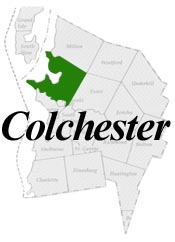
Click
to enlarge |
North
of Burlington lies the multi-faceted town of Colchester.
A broad spectrum of neighborhoods, light industry,
commercial, and recreation has created a community
that serves a variety of interests and lifestyles
among those who live or work within its boundaries.
Colchester Village, the former town center near
the intersections of Routes 7 and 2A, is reminiscent
of a New England Village, with picturesque homes
in a variety of historic styles clustered around
the church, library, and the former town hall. The
official town center is now located on Blakely Road
in Mallets Bay.
The population of Mallets Bay, one of Lake Champlain's
largest and most beautiful bays, becomes a hive
of activity each summer. Lined with summer camps,
campgrounds, and marinas, a wealth of activities
are available for boating and sailing enthusiasts.
Recreational activities at Bayside Park's public
beach, tennis and shuffleboard courts, ball fields,
and senior center attract all ages.
A variety of neighborhoods reflect the lifestyles
of the inhabitants. The area around Porters Point
and Mills Point finds summer camps on the lakeshore,
with contemporary year round homes in the surrounding
neighborhoods. On the hillsides above Mallets Bay,
upscale homes take advantage of the incredible lake
views. On the opposite side of town, Fort Ethan
Allen, a former cavalry installation, has been restored,
its Officer's Row converted into privately owned
condominiums prized for their spaciousness and ambience.
The north end of Colchester encompasses Clay Point,
the site of private estates. New home construction
is steadily rising as the desirabillity of Colchester's
integral beauty, excellent school system, and proximity
to employment, the Interstate, and major highways
attracts new residents.
Colchester has six business parks for commercial
and industrial use, including Ethan Allen Industrial
Park, The Park at Water Tower Hill; Colchester Business
Park, Sunderland Industrial Park, Meadows Industrial
Park, and Demers Industrial Park. Largest employers
include the Visiting Nurses Association, St. Michael's
College, Fletcher Allen Health Care Fanny Allen
Campus, Camp Johnson, Colchester School District,
Champlain Cable Corp., Engelberth Construction,
Costco Wholesale, Hampton Inn, Severn Trent Laboratories,
Hazelett Strip-Casting, McDonald's, Inc., and Green
Mountain Power Corporation.
Chartered by Benning Wentworth on June 7, 1763,
Colchester's original tract consisted of six square
miles bounded by the "French or Onion River" on
the South and Lake Champlain on the West. Ira Allen
was voted the "proprietors Clark for the Town" on
March 23, 1773 at a meeting held at the home of
Capt. Samuel Moore, a Salisbury CT innkeeper. The
proprietors consisted of Ethan, Ira, Heman, and
Zimry Allen, and Remember Baker, known as the Onion
River Company. As in other Chittenden County towns,
Ira Allen was voted surveyor, selecting a site for
himself on the hill overlooking the Winooski River
at Winooski Falls, an area considered part of Colchester
until the 1890s and is now the city of Winooski.
Colchester soon became one of the more settled towns
in the region, a situation which did not become
precarious until the outbreak of hostilities between
the British and the colonists. Residents fled to
other communities for safety, the majority not returning
until 1783, well after the Revolutionary War had
ended. Saw mills were among the earliest enterprises
in the town. Most of the farms were self-sufficient,
growing crop. It was economical to build brick houses
during that period, since clay was plentiful and
a makeshift kiln could be set up in a spot convenient
to the source of material and home being built.
Many of these homes are still occupied, several
by descendants of the original builders.
Although there is still a lot of open land and many
of the roads follow those cleared by early settlers,
the scope and type of the industry and use of large
portions of the Colchester has changed dramatically
since its original charter. Still, with its location
on the lake, it remains a favorite place for those
in the Champlain Valley to live, work and play.
|
|

